Steffi Chern
Michael Pokorny
LiveTalk: Real-Time Multimodal Interactive Video Diffusion via Improved On-Policy Distillation
Dec 29, 2025Abstract:Real-time video generation via diffusion is essential for building general-purpose multimodal interactive AI systems. However, the simultaneous denoising of all video frames with bidirectional attention via an iterative process in diffusion models prevents real-time interaction. While existing distillation methods can make the model autoregressive and reduce sampling steps to mitigate this, they focus primarily on text-to-video generation, leaving the human-AI interaction unnatural and less efficient. This paper targets real-time interactive video diffusion conditioned on a multimodal context, including text, image, and audio, to bridge the gap. Given the observation that the leading on-policy distillation approach Self Forcing encounters challenges (visual artifacts like flickering, black frames, and quality degradation) with multimodal conditioning, we investigate an improved distillation recipe with emphasis on the quality of condition inputs as well as the initialization and schedule for the on-policy optimization. On benchmarks for multimodal-conditioned (audio, image, and text) avatar video generation including HDTF, AVSpeech, and CelebV-HQ, our distilled model matches the visual quality of the full-step, bidirectional baselines of similar or larger size with 20x less inference cost and latency. Further, we integrate our model with audio language models and long-form video inference technique Anchor-Heavy Identity Sinks to build LiveTalk, a real-time multimodal interactive avatar system. System-level evaluation on our curated multi-turn interaction benchmark shows LiveTalk outperforms state-of-the-art models (Sora2, Veo3) in multi-turn video coherence and content quality, while reducing response latency from 1 to 2 minutes to real-time generation, enabling seamless human-AI multimodal interaction.
Thinking with Generated Images
May 28, 2025Abstract:We present Thinking with Generated Images, a novel paradigm that fundamentally transforms how large multimodal models (LMMs) engage with visual reasoning by enabling them to natively think across text and vision modalities through spontaneous generation of intermediate visual thinking steps. Current visual reasoning with LMMs is constrained to either processing fixed user-provided images or reasoning solely through text-based chain-of-thought (CoT). Thinking with Generated Images unlocks a new dimension of cognitive capability where models can actively construct intermediate visual thoughts, critique their own visual hypotheses, and refine them as integral components of their reasoning process. We demonstrate the effectiveness of our approach through two complementary mechanisms: (1) vision generation with intermediate visual subgoals, where models decompose complex visual tasks into manageable components that are generated and integrated progressively, and (2) vision generation with self-critique, where models generate an initial visual hypothesis, analyze its shortcomings through textual reasoning, and produce refined outputs based on their own critiques. Our experiments on vision generation benchmarks show substantial improvements over baseline approaches, with our models achieving up to 50% (from 38% to 57%) relative improvement in handling complex multi-object scenarios. From biochemists exploring novel protein structures, and architects iterating on spatial designs, to forensic analysts reconstructing crime scenes, and basketball players envisioning strategic plays, our approach enables AI models to engage in the kind of visual imagination and iterative refinement that characterizes human creative, analytical, and strategic thinking. We release our open-source suite at https://github.com/GAIR-NLP/thinking-with-generated-images.
Generative AI Act II: Test Time Scaling Drives Cognition Engineering
Apr 21, 2025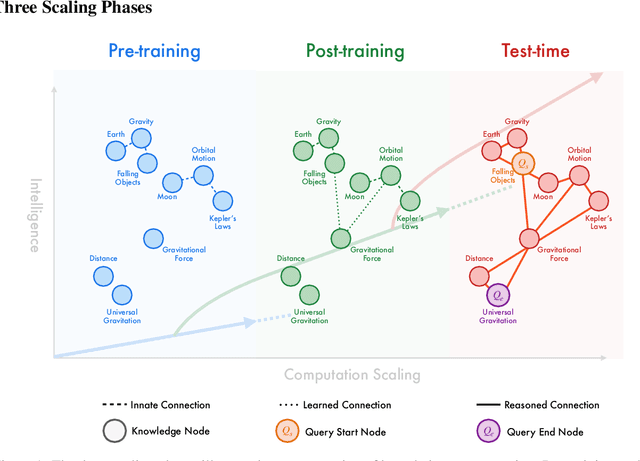
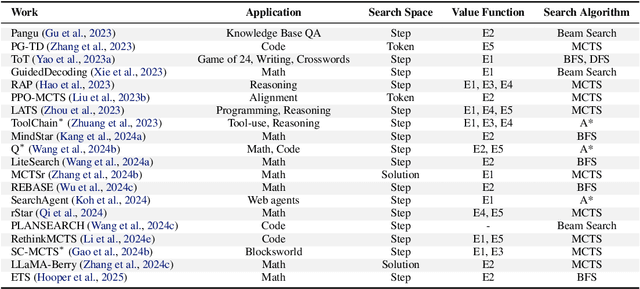
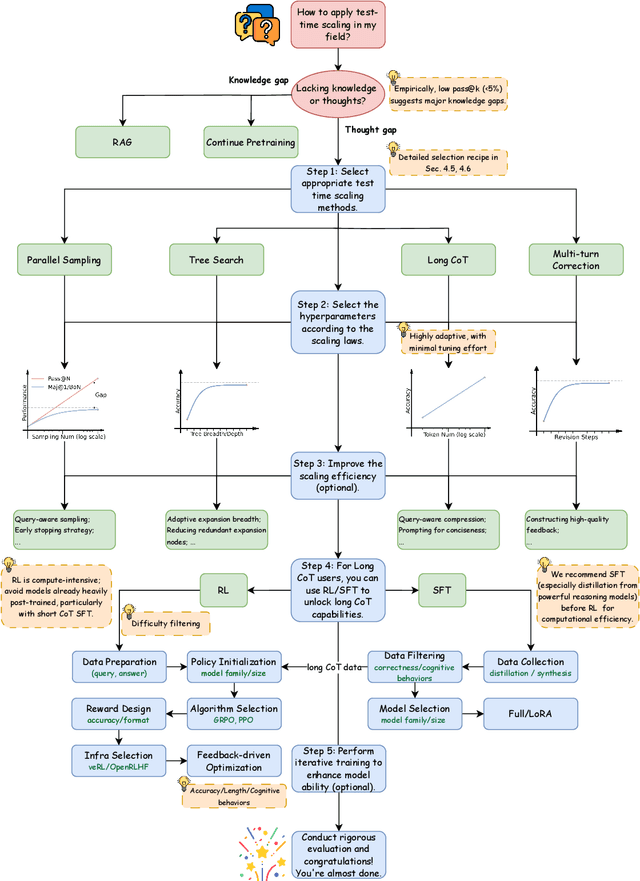
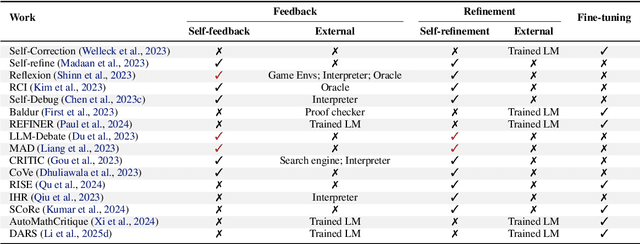
Abstract:The first generation of Large Language Models - what might be called "Act I" of generative AI (2020-2023) - achieved remarkable success through massive parameter and data scaling, yet exhibited fundamental limitations such as knowledge latency, shallow reasoning, and constrained cognitive processes. During this era, prompt engineering emerged as our primary interface with AI, enabling dialogue-level communication through natural language. We now witness the emergence of "Act II" (2024-present), where models are transitioning from knowledge-retrieval systems (in latent space) to thought-construction engines through test-time scaling techniques. This new paradigm establishes a mind-level connection with AI through language-based thoughts. In this paper, we clarify the conceptual foundations of cognition engineering and explain why this moment is critical for its development. We systematically break down these advanced approaches through comprehensive tutorials and optimized implementations, democratizing access to cognition engineering and enabling every practitioner to participate in AI's second act. We provide a regularly updated collection of papers on test-time scaling in the GitHub Repository: https://github.com/GAIR-NLP/cognition-engineering
Rethinking RL Scaling for Vision Language Models: A Transparent, From-Scratch Framework and Comprehensive Evaluation Scheme
Apr 03, 2025Abstract:Reinforcement learning (RL) has recently shown strong potential in improving the reasoning capabilities of large language models and is now being actively extended to vision-language models (VLMs). However, existing RL applications in VLMs often rely on heavily engineered frameworks that hinder reproducibility and accessibility, while lacking standardized evaluation protocols, making it difficult to compare results or interpret training dynamics. This work introduces a transparent, from-scratch framework for RL in VLMs, offering a minimal yet functional four-step pipeline validated across multiple models and datasets. In addition, a standardized evaluation scheme is proposed to assess training dynamics and reflective behaviors. Extensive experiments on visual reasoning tasks uncover key empirical findings: response length is sensitive to random seeds, reflection correlates with output length, and RL consistently outperforms supervised fine-tuning (SFT) in generalization, even with high-quality data. These findings, together with the proposed framework, aim to establish a reproducible baseline and support broader engagement in RL-based VLM research.
Humanity's Last Exam
Jan 24, 2025Abstract:Benchmarks are important tools for tracking the rapid advancements in large language model (LLM) capabilities. However, benchmarks are not keeping pace in difficulty: LLMs now achieve over 90\% accuracy on popular benchmarks like MMLU, limiting informed measurement of state-of-the-art LLM capabilities. In response, we introduce Humanity's Last Exam (HLE), a multi-modal benchmark at the frontier of human knowledge, designed to be the final closed-ended academic benchmark of its kind with broad subject coverage. HLE consists of 3,000 questions across dozens of subjects, including mathematics, humanities, and the natural sciences. HLE is developed globally by subject-matter experts and consists of multiple-choice and short-answer questions suitable for automated grading. Each question has a known solution that is unambiguous and easily verifiable, but cannot be quickly answered via internet retrieval. State-of-the-art LLMs demonstrate low accuracy and calibration on HLE, highlighting a significant gap between current LLM capabilities and the expert human frontier on closed-ended academic questions. To inform research and policymaking upon a clear understanding of model capabilities, we publicly release HLE at https://lastexam.ai.
Halu-J: Critique-Based Hallucination Judge
Jul 17, 2024Abstract:Large language models (LLMs) frequently generate non-factual content, known as hallucinations. Existing retrieval-augmented-based hallucination detection approaches typically address this by framing it as a classification task, evaluating hallucinations based on their consistency with retrieved evidence. However, this approach usually lacks detailed explanations for these evaluations and does not assess the reliability of these explanations. Furthermore, deficiencies in retrieval systems can lead to irrelevant or partially relevant evidence retrieval, impairing the detection process. Moreover, while real-world hallucination detection requires analyzing multiple pieces of evidence, current systems usually treat all evidence uniformly without considering its relevance to the content. To address these challenges, we introduce Halu-J, a critique-based hallucination judge with 7 billion parameters. Halu-J enhances hallucination detection by selecting pertinent evidence and providing detailed critiques. Our experiments indicate that Halu-J outperforms GPT-4o in multiple-evidence hallucination detection and matches its capability in critique generation and evidence selection. We also introduce ME-FEVER, a new dataset designed for multiple-evidence hallucination detection. Our code and dataset can be found in https://github.com/GAIR-NLP/factool .
BeHonest: Benchmarking Honesty of Large Language Models
Jun 19, 2024Abstract:Previous works on Large Language Models (LLMs) have mainly focused on evaluating their helpfulness or harmlessness. However, honesty, another crucial alignment criterion, has received relatively less attention. Dishonest behaviors in LLMs, such as spreading misinformation and defrauding users, eroding user trust, and causing real-world harm, present severe risks that intensify as these models approach superintelligence levels. Enhancing honesty in LLMs addresses critical deficiencies and helps uncover latent capabilities that are not readily expressed. This underscores the urgent need for reliable methods and benchmarks to effectively ensure and evaluate the honesty of LLMs. In this paper, we introduce BeHonest, a pioneering benchmark specifically designed to assess honesty in LLMs comprehensively. BeHonest evaluates three essential aspects of honesty: awareness of knowledge boundaries, avoidance of deceit, and consistency in responses. Building on this foundation, we designed 10 scenarios to evaluate and analyze 9 popular LLMs on the market, including both closed-source and open-source models from different model families with varied model sizes. Our findings indicate that there is still significant room for improvement in the honesty of LLMs. We also encourage the AI community to prioritize honesty alignment in LLMs. Our benchmark and code can be found at: \url{https://github.com/GAIR-NLP/BeHonest}.
OlympicArena: Benchmarking Multi-discipline Cognitive Reasoning for Superintelligent AI
Jun 18, 2024
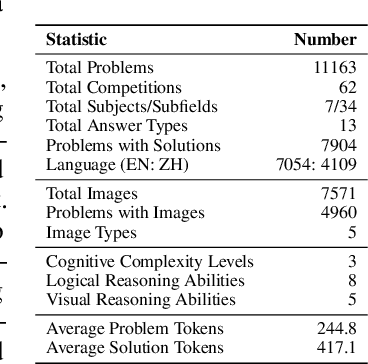
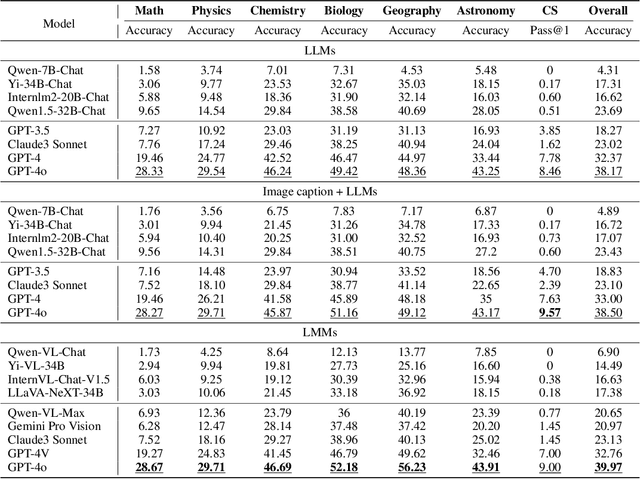
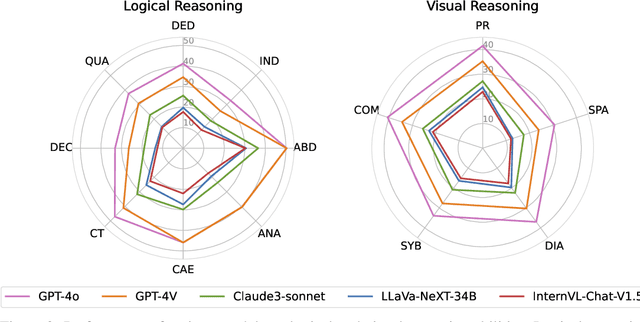
Abstract:The evolution of Artificial Intelligence (AI) has been significantly accelerated by advancements in Large Language Models (LLMs) and Large Multimodal Models (LMMs), gradually showcasing potential cognitive reasoning abilities in problem-solving and scientific discovery (i.e., AI4Science) once exclusive to human intellect. To comprehensively evaluate current models' performance in cognitive reasoning abilities, we introduce OlympicArena, which includes 11,163 bilingual problems across both text-only and interleaved text-image modalities. These challenges encompass a wide range of disciplines spanning seven fields and 62 international Olympic competitions, rigorously examined for data leakage. We argue that the challenges in Olympic competition problems are ideal for evaluating AI's cognitive reasoning due to their complexity and interdisciplinary nature, which are essential for tackling complex scientific challenges and facilitating discoveries. Beyond evaluating performance across various disciplines using answer-only criteria, we conduct detailed experiments and analyses from multiple perspectives. We delve into the models' cognitive reasoning abilities, their performance across different modalities, and their outcomes in process-level evaluations, which are vital for tasks requiring complex reasoning with lengthy solutions. Our extensive evaluations reveal that even advanced models like GPT-4o only achieve a 39.97% overall accuracy, illustrating current AI limitations in complex reasoning and multimodal integration. Through the OlympicArena, we aim to advance AI towards superintelligence, equipping it to address more complex challenges in science and beyond. We also provide a comprehensive set of resources to support AI research, including a benchmark dataset, an open-source annotation platform, a detailed evaluation tool, and a leaderboard with automatic submission features.
Can Large Language Models be Trusted for Evaluation? Scalable Meta-Evaluation of LLMs as Evaluators via Agent Debate
Jan 30, 2024Abstract:Despite the utility of Large Language Models (LLMs) across a wide range of tasks and scenarios, developing a method for reliably evaluating LLMs across varied contexts continues to be challenging. Modern evaluation approaches often use LLMs to assess responses generated by LLMs. However, the meta-evaluation conducted to assess the effectiveness of these LLMs as evaluators is typically constrained by the coverage of existing benchmarks or requires extensive human annotation. This underscores the urgency of methods for scalable meta-evaluation that can effectively, reliably, and efficiently evaluate the performance of LLMs as evaluators across diverse tasks and scenarios, particularly in potentially new, user-defined scenarios. To fill this gap, we propose ScaleEval, an agent-debate-assisted meta-evaluation framework that leverages the capabilities of multiple communicative LLM agents. This framework supports multi-round discussions to assist human annotators in discerning the most capable LLMs as evaluators, which significantly eases their workload in cases that used to require large-scale annotations during meta-evaluation. We release the code for our framework, which is publicly available at: \url{https://github.com/GAIR-NLP/scaleeval}.
Combating Adversarial Attacks with Multi-Agent Debate
Jan 11, 2024Abstract:While state-of-the-art language models have achieved impressive results, they remain susceptible to inference-time adversarial attacks, such as adversarial prompts generated by red teams arXiv:2209.07858. One approach proposed to improve the general quality of language model generations is multi-agent debate, where language models self-evaluate through discussion and feedback arXiv:2305.14325. We implement multi-agent debate between current state-of-the-art language models and evaluate models' susceptibility to red team attacks in both single- and multi-agent settings. We find that multi-agent debate can reduce model toxicity when jailbroken or less capable models are forced to debate with non-jailbroken or more capable models. We also find marginal improvements through the general usage of multi-agent interactions. We further perform adversarial prompt content classification via embedding clustering, and analyze the susceptibility of different models to different types of attack topics.
 Add to Chrome
Add to Chrome Add to Firefox
Add to Firefox Add to Edge
Add to Edge